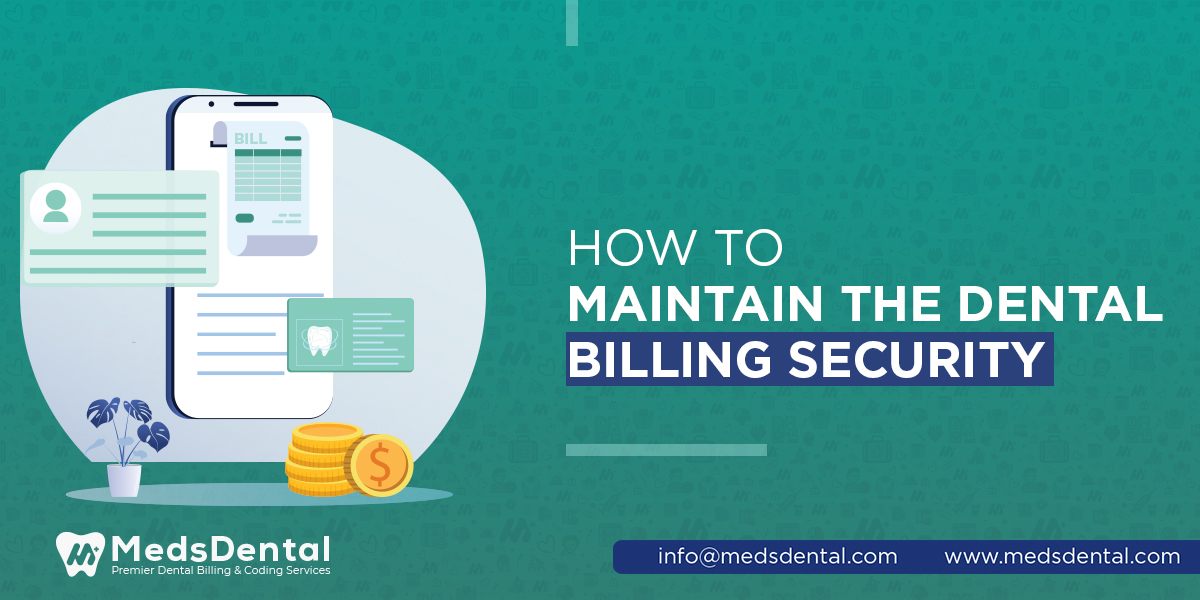

Data security is becoming one of the top issues facing all sectors of society. Nevertheless, keeping top security becomes even more critical if you work in the healthcare industry because data breaches are at a record-breaking rate in this sector. Several reports that often circulate concern heavy fines being imposed on well-known industry leaders due to violations that might have been totally ignored. (Numbers at a Glance, 2022) Moreover, according to the American Dental Association, ransomware affected hundreds of dental businesses in August 2019. In light of this, maintaining compliance with the laws and guidelines outlined in the Health Insurance Portability and Accountability Act (HIPAA) is crucial to the efficient operation of your dental clinic.
Coding and billing fall under this category. Dental records are critical for the security of both the dentist and the patient, and their upkeep is regarded as a legal and ethical duty of the dentist. (Devadiga, 2014) But, it is unfortunate that information breach is increasing in healthcare sectors. Research states that annually, 19.4 million people are impacted by hacking and unauthorized use of PHI, compared to 4.6 million by theft or loss of PHI. (Johan Gustav Bellika, Alexandra Makhlysheva, Per Atle Bakkevoll) It is essential for every dental practitioner to under specific ways how to maintain the dental billing security so that they can implement those strategies in their practice and gain benefit from them. So, without any further ago, let’s go ahead.
Moving forward, it is a frequently asked question “does Medicare cover oral devices for Sleep Apnea?” So today we have appeared with a quick answer to your question. Let’s go ahead.
Set a strong password:
Don’t use the same password for everything:
Do not provide access to everyone to your billing procedure:
A Verizon study shows that insiders are responsible for 58% of healthcare data breaches. Practice assessing and educating your whole crew on data security methodologies regularly. Strong passwords, encryption to protect your billing/coding data, and other security measures can only be helpful if your personnel, who are the first point of contact for customers and clients, are appropriately educated. A significant cybersecurity group and Stanford University researchers discovered that employee error accounts for about 88 percent of all data breaches. So train your staff about
Research reports that the most prevalent form of breach cited was a failure to encrypt emails sent outside the firm. Only a modest percentage of clinical (25.5%) and non-clinical (30.4%) employees reported knowing how to encrypt emails. (Mubashir Aslam Arain, Rima Tarraf, and Armaghan Ahmad, 2019) To tackle the problems of securing patient information, necessary steps, such as appropriate IT training and education, are needed.(Mubashir Aslam Arain, Rima Tarraf, and Armaghan Ahmad, 2019)
Risk assessment methodologies are the most crucial components of the risk management process. (Konstantina Georgieva, Ayaz Farooq & Reiner R. Dumke ) Risk assessments are a critical element when trying to maintain your billing/coding procedures HIPAA compliant and strengthen your practice’s entire cybersecurity strategy.
The Department of Health and Human Services (HHS) mandates that all healthcare organizations, including small provider groups, large health systems, and business partners of these covered entities, continually assess the risks and vulnerabilities to their data and create a backup plan for minimizing those risks in the scenario of a breach.
According to the study results, only a small percentage of organizations (34% and 32%) have taken steps to conduct cyber security risk assessments. (Cyber Security Breaches Survey 2021, 2021) This step should not be ignored by any practice in order to keep them safe from any breach.
Cyber-liability insurance should be taken out to ensure that you are covered if confidential patient data is hacked. It may be included in your dental office’s general practice insurance plan and will pay for the legal fees resulting from a data breach.
Additionally, your business suppliers and partners must have their own cyber-liability insurance. Before allowing access to your EHR to third-party clinicians, get proof of their insurance.
Most dental offices lack the IT staff and funding to keep their on-site dental practice management software updated with the latest cybersecurity standards. Meanwhile, malware and virus operations might target local servers that store critical data.
Moving your data from an in-house solution to a cloud-based program built on reliable platforms is the best method to safeguard critical data. A survey reported that compared to standalone server setups, clouds might provide higher security benefits. Moreover, clouds reduce the need for user engagement by hiding technical information from their consumers, such as software upgrades, licensing, and maintenance. (Issa Khalil, Abdallah Khreishah, Muhammad Azeem, 2014)
When you employ third parties to process data and charge on your behalf, you guarantee, through an agreement, that the third party takes such steps in order to retain the company’s commitment to data protection while billing.
The most excellent service provider for dentistry and medical professionals around the nation is the MedsDental Dental Billing Company Our company is a perfect choice regarding billing and coding with confidentiality. Since its inception, our company has been serving dentists’ dental billing and EHR demands in many US states. The experts are devoted to increasing your practice’s overall profits while providing HIPAA-compliant to maintain data security and your trust. Additionally, it provides a wide choice of financing for your clinic without compromising the confidentiality and safety of medical records. Utilize our assistance for reimbursing patients for dental operations, increase your income, maintain the safety of medical records, expand your practice’s reach, and boost your clients’ general well-being.
© MedsDental. All rights reserved 2026. Powered by MeshSq.